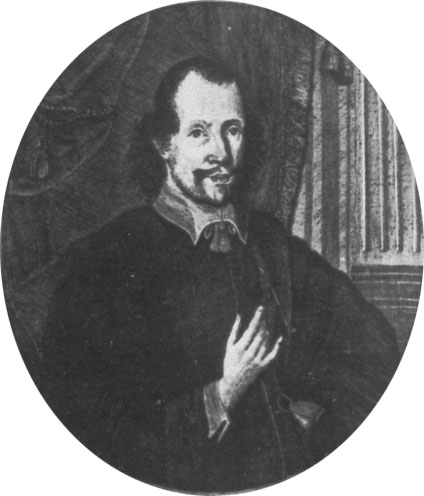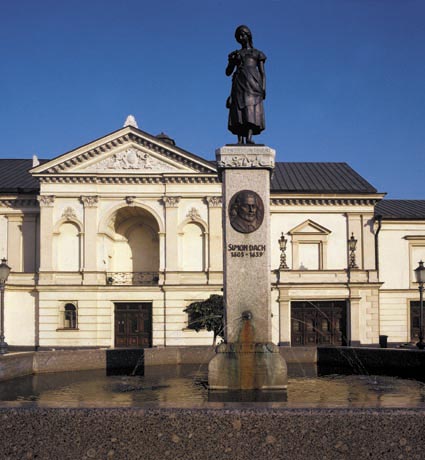<Back to Index>
- Mathematician Béla Szőkefalvi - Nagy, 1913
- Poet Simon Dach, 1605
- Major General of the United States Army James Blair Steedman, 1817
PAGE SPONSOR


Simon Dach (29 July 1605 – 15 April 1659) was a Prussian German lyrical poet and writer of hymns, born in Memel (now Klaipėda) in the Duchy of Prussia.
Although brought up in humble circumstances, (his father was a poorly paid court interpreter in Lithuania), he received a classical education in the Domschule of Königsberg, and in the Latin schools of Wittenberg, and Magdeburg, and entered the University of Königsberg in 1626 where he was a student of theology and philosophy. In 1626, he left Magdeburg to escape both the plague and the 30 Years War, and returned to his Prussian homeland, settling in Königsberg, where he remained for the rest of his life.
After earning his degree, Dach was a private tutor for a time, then was appointed Kollaboralor (teacher) in 1633 and co-rector of the Domschule (cathedral school) in Königsberg in 1636. In 1639 he was appointed by Adrian Brauer to the Chair of Poetry at the Albertina University in Königsberg. This was a post he held until his death. Also, in 1640 he received a doctorate from the University.
Part of his official duties as Chair of Poetry was to create poems for various University celebrations, programs, debates and funeral services of his colleagues - all of these written either Latin or Greek. In 1644, he wrote the Play Sorbuisa which celebrated the centennial of the University of Königsberg.
Dach became one of the prominent heads of the musical Kürbishütte, a group that included, among others, George Weissel, Valentin Thilo and Johann Franck. The summer house of organist and composer Heinrich Albert became
the meeting place of this group of poets, hymnists and musicians, who
met in to create new hymns as well as to give readings of their own
poetry. This group published eight books of poems and songs from 1638 to
1650, the books meeting with great success. Of the approximately 200
poems and songs contained within the books, Dach had the lion's share,
with 125 being his compositions. The songs and hymns contained in these
books, especially those of Dach, were sung throughout Germany and
frequently appeared in pirated editions. In Königsberg he became friends with and collaborated with Heinrich Albert (1604 – 1651), Robert Roberthin (1600 – 1648) and Sibylla Schwarz (1621 – 1638), and with them formed the Königsberger Dichtergruppe (loosely
translated as the "Königsberg Poets' Association"). In 1639 he was
appointed professor of poetry at Königsberg through the influence
of his friend Roberthin. He sang the praises of the house of the Electors of Brandenburg in a collection of poems entitled Kurbrandenburgische Rose, Adler, Lowe und Scepter (1661), and also produced many occasional poems, several of which became popular; the most famous of them is "Anke von Tharaw öss, de my geföllt" (rendered from Low Saxon by Herder into modern German as "Ännchen von Tharau"), composed in 1637 in honor of the marriage of a friend. Among Dach's best known hymns, many of which are still sung, are the following: "Ich bin ja, Herr, in deiner Macht", "Ich bin bei Gott in Gnaden durch Christi Blut und Tod", and "O, wie selig seid ihr doch, ihr Frommen." In
all, he wrote over 150 hymns, and a number of poems, and was considered
the leading figure of the hymnists and poets of Königsberg.